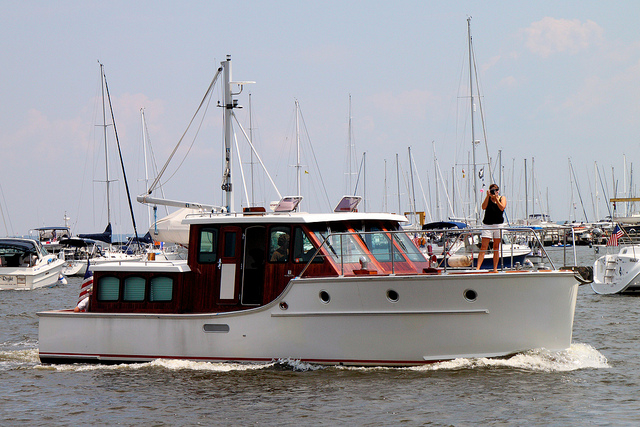Limit sought on boat tax might help struggling industry, hurt waterway fund
By Becca Heller
[email protected]
A state bill proposing to set a $10,000 maximum tax on boat sales sparked a tense debate due to its potential implications on Maryland’s struggling maritime economy and the Waterway Improvement Fund (WIF).
The bill was drafted with aims to stimulate local marine-related jobs and businesses and discourage out-of-state purchase of boats — a practice which has become increasingly common due to the lower sales tax of vessels in neighboring states.
“Working where I do, I have a front row seat to the recreational marine world, and the past few years have been alarming,” said Bill Brandon, who works at Tidewater Yacht Service in Baltimore. “Vessels that have been registered and kept in Maryland are being sold and shipped out of state at a rising rate.”
Lower tax undermines waterway fund
Lowering the boat tax, however, would reduce funding to the already underfunded waterway fund; and while the annual cost to maintain existing boating infrastructure is about $41 million, the fund brought in just $14.5 million in fiscal 2012, according to the Department of Natural Resources.
“House Bill 548 would further reduce the Waterway Improvement Fund, leaving Maryland unable to maintain waterway navigation channels, resulting in public safety hazards, access issues for commercial watermen, detriments to restaurants, marinas, and tourism, and a loss of boating related jobs,” said Olivia Anderson, legislative director of the Department of Natural Resources.
Proponents of HB 548 counter that the initiative, which most notably made Florida $13.5 million in 18 months, would generate significant capital for the industry and would in turn be a positive thing for WIF. The Department of Legislative Services estimated that the sale would result in about $3 million less in revenue based on past tax collections, but said that number could vary widely if boat sales increased due to the lower tax.
Tax cap helps sales of high-priced boats, but hurts average owner
With the tax cap, the bill particularly incentivizes the purchase of larger, more expensive boats — a factor which some feel is critical to healthy maritime economy.
“Boat US statistics show that 10% of a vessel’s value is spent each year on maintenance, repair and storage,” said Susan Zeller, the executive director of the Marine Trades Association of Maryland. “As an industry, we are missing out on a substantial amount of maintenance, repair and storage by not registering more boats in the 50 to 70 foot range.”
Others feel that the $10,000 tax cap unfairly advantages those who are already wealthy enough to purchase bigger boats, leaving the brunt of the tax responsibility on the “average” boater.
“Limiting or capping the tax at a specified dollar amount would mean that a purchaser of a vessel with a smaller fair market value would be paying the full 5%, while a purchaser of a vessel with a greater fair market value would be paying a smaller percentage of tax,” said Andrea Mansfield, the legislative director of Maryland Association of Counties. “This does not constitute fair tax policy.”
Supporters of the bill assert that, on the contrary, this bill would benefit, not just the wealthy, but also small businesses and the state.
“While buyers do benefit from these tax policies, the real winners are state treasuries and the hundreds of workers who depend upon the business generated by these boats,” said David Dickerson, state government relations director for the National Marine Manufacturers Association.

MarylandReporter.com is a daily news website produced by journalists committed to making state government as open, transparent, accountable and responsive as possible – in deed, not just in promise. We believe the people who pay for this government are entitled to have their money spent in an efficient and effective way, and that they are entitled to keep as much of their hard-earned dollars as they possibly can.

